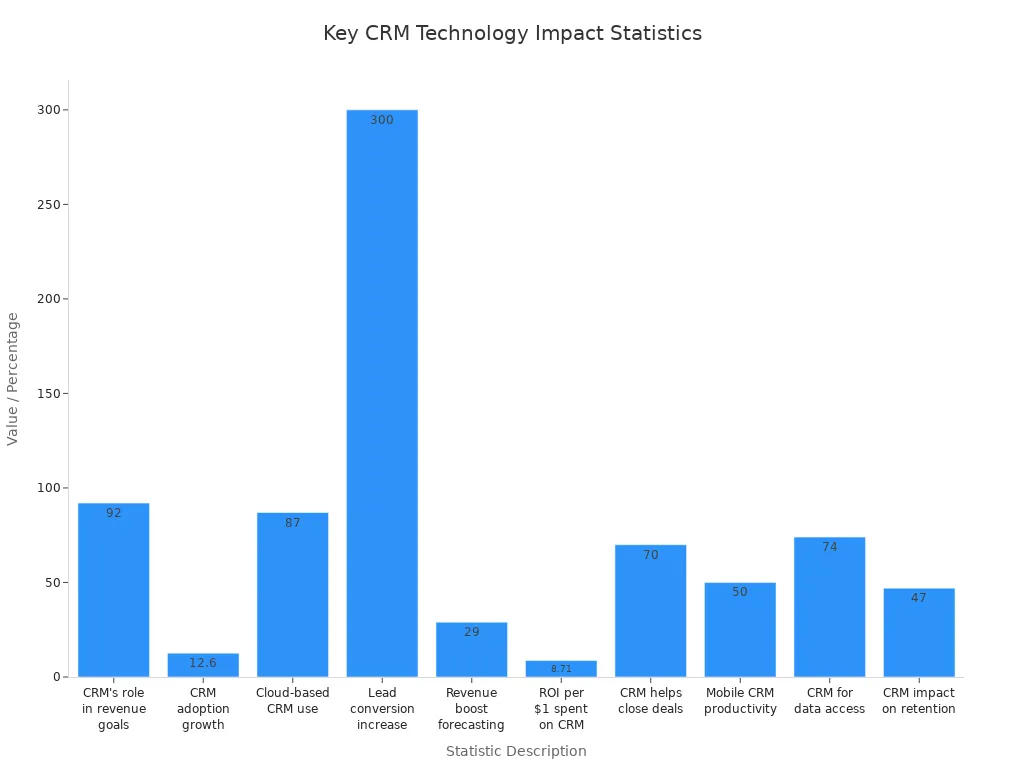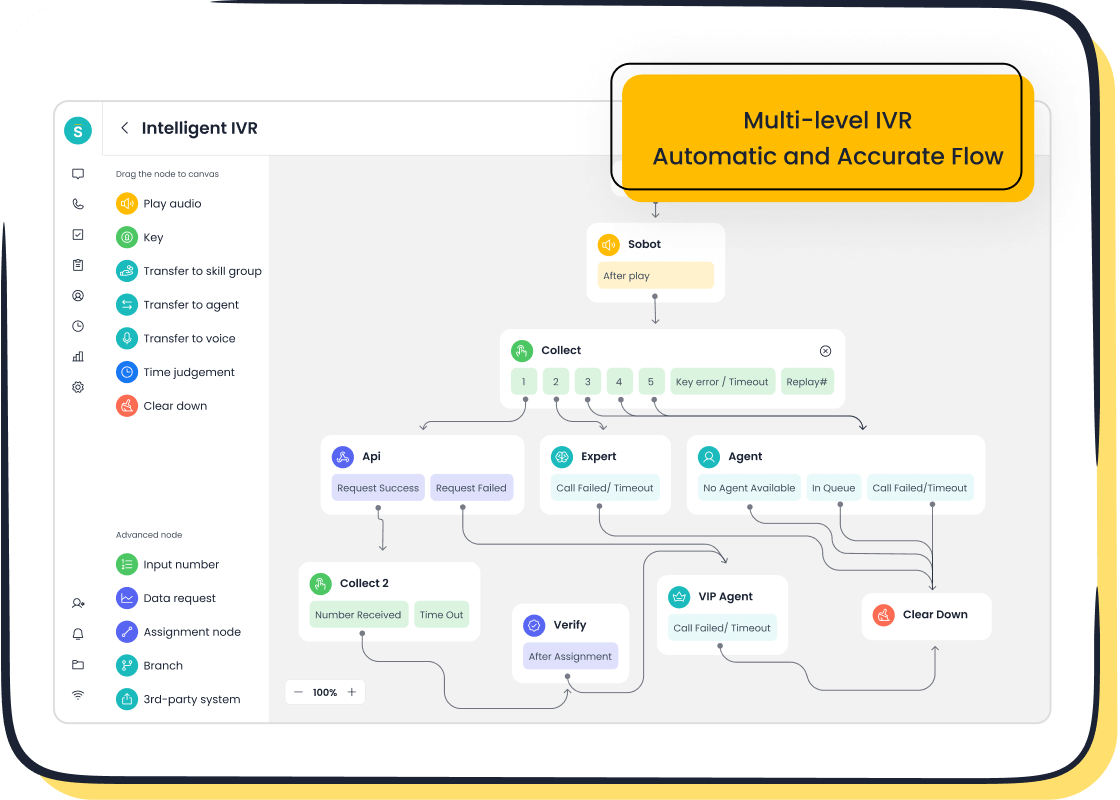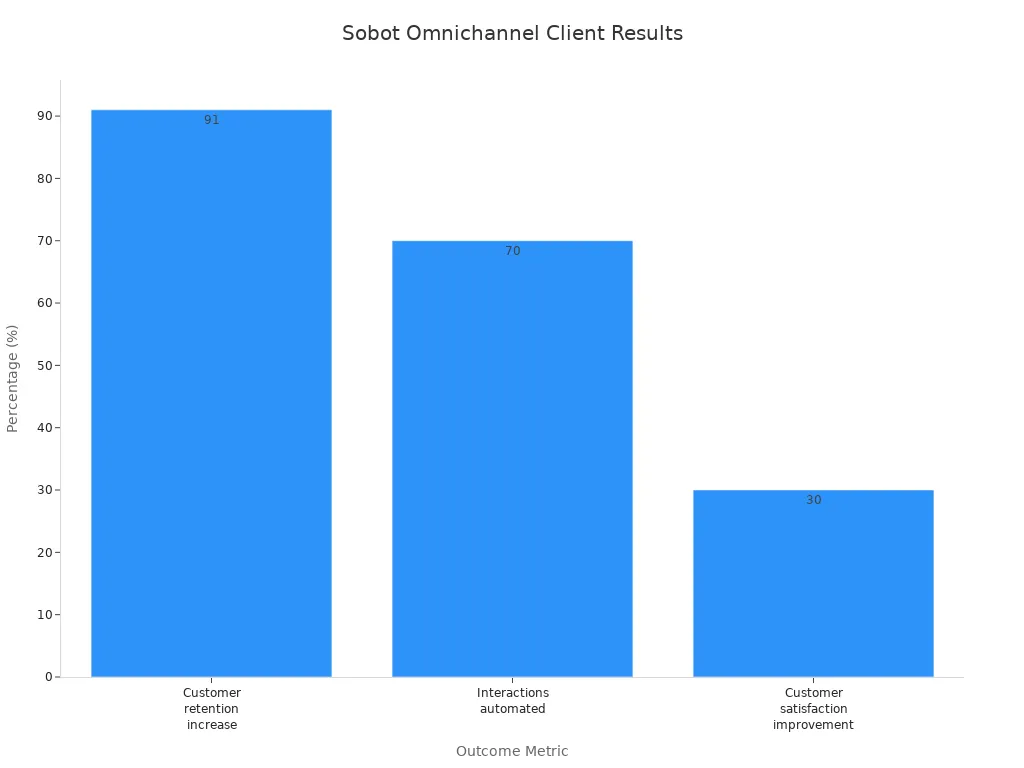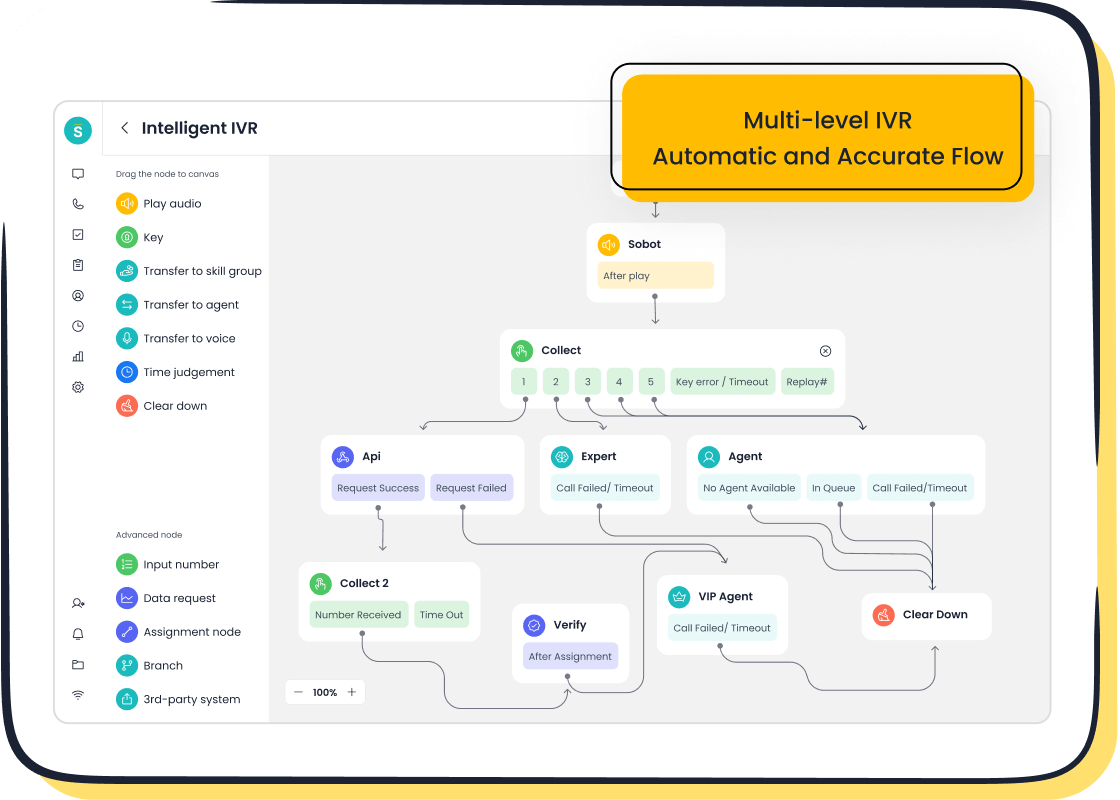CRM Optimization Trends Every Business Leader Must Watch

Customer relationship management continues to transform business leadership in the digital age. Recent research shows that 92% of organizations now recognize CRM’s role in meeting revenue goals, while 87% deploy cloud-based platforms to support digital transformation. Companies like Sobot lead with intelligent contact center solutions, such as Sobot AI and Sobot call center, helping teams build stronger relationships and improve operational efficiency. The latest crm optimization strategies and crm trends shaping the future allow leaders to boost engagement, enhance relationships, and respond quickly to changing customer needs.

Organizations that focus on crm optimization and adopt new crm trends can outperform competitors by up to 25% in customer engagement and retention, reduce costs by 30%, and gain deeper insights into customer behavior. Sobot empowers businesses to stay ahead and turn these trends into a lasting competitive edge.
AI in CRM

Artificial intelligence is transforming CRM systems, driving the latest trends in crm automation and reshaping how businesses connect with customers. Companies now rely on ai-powered crm platforms to streamline operations, personalize experiences, and boost productivity. The table below highlights key ways artificial intelligence integrates into modern CRM solutions:
| AI Integration Aspect | Description |
|---|---|
| Predictive Analytics | Uses historical data and customer behavior to forecast sales, manage customer churn, and optimize sales processes. |
| Personalization | AI algorithms analyze customer data to recommend products or services tailored to individual needs across multiple channels. |
| Automation | AI-powered chatbots and virtual assistants handle routine inquiries and provide 24/7 customer support, freeing employees for complex tasks. |
| Sentiment Analysis | Analyzes social media and customer feedback in real-time to monitor customer sentiment and improve retention. |
| Lead Scoring and Segmentation | AI prioritizes leads based on demographics and behavior, improving targeting and campaign management. |
Automation
Automation stands at the forefront of crm trends. Businesses use ai-powered crm tools to automate repetitive tasks, such as data entry, lead scoring, and ticket routing. This shift allows teams to focus on high-value activities. For example, insurance companies have reported over 70% reduction in service times after adopting AI-driven automation. Sobot’s intelligent contact center solutions leverage automation to deliver 24/7 support, reduce agent workload, and improve first-contact resolution. Companies also benefit from real-time analytics, which enable immediate strategic adjustments and data-driven decisions.
Personalization
Personalization powered by artificial intelligence has become a game-changer in customer retention. AI analyzes customer data, purchase history, and engagement patterns to deliver tailored recommendations and communications. Businesses using ai-powered crm platforms see higher engagement and loyalty. One software company reduced churn by 52% through AI-driven prediction and proactive outreach. Sobot’s unified workspace uses AI to segment customers and personalize interactions across channels, helping brands build lasting relationships and increase renewal rates.
Conversational AI
Conversational AI represents one of the most exciting trends in CRM. Advanced chatbots and voice assistants now understand context, detect emotions, and provide empathetic responses. These systems use natural language processing to improve intent detection and deliver relevant answers. By 2025, over half of CRM interactions are expected to be voice-based, reflecting customer preference for convenience. Sobot’s AI-driven chatbots and voicebots enable businesses to offer instant, accurate support, freeing agents for more complex tasks and enhancing customer satisfaction. The rapid growth of conversational AI signals a new era of innovation in customer engagement.
Omnichannel Experience

Unified Channels
Unified channels form the backbone of a successful omnichannel customer experience. Businesses that connect all communication channels—such as chat, email, phone, and social media—create a seamless environment for both customers and agents. Agents gain complete visibility into every interaction, which means customers never need to repeat themselves. This approach reduces friction and ensures faster, more personalized service. Companies using unified channels report higher customer satisfaction and loyalty. They also benefit from real-time collaboration tools, intelligent call routing, and instant access to customer data. These features help teams resolve issues quickly and build stronger relationships.
- Omnichannel CRM provides a full view of customer interactions across all channels.
- Customers can switch between channels without losing context.
- Unified platforms support better collaboration among sales, marketing, and support teams.
- Predictive insights help agents anticipate needs and personalize conversations.
- Seamless handoffs and shared inboxes improve efficiency and customer experience.
Customer Journey
Mapping the customer journey is essential for crm optimization. Companies that track every step of the journey—from first contact to post-purchase—can identify pain points and deliver consistent experiences. Research shows that mapping the journey improves onboarding, aligns with real customer behavior, and unifies customer data. AI tools analyze large volumes of data to predict behavior and personalize interactions in real time. This reduces friction and increases customer satisfaction. For example, TireHub used AI-powered automation to handle thousands of daily interactions, while Nassau Financial Group reduced handle time and improved satisfaction by mapping the journey and using AI.
Sobot Omnichannel Solution
Sobot’s Omnichannel Solution stands out for its innovation and impact on the omnichannel customer experience. The platform features AI-driven chatbots, a unified workspace, advanced analytics, and seamless integration with Salesforce and Shopify. Sobot enables businesses to manage all channels from one interface, orchestrate multi-step customer journeys, and personalize every touchpoint. Clients have achieved remarkable results:
| Feature Category | Description | Client Results / Impact |
|---|---|---|
| AI-Powered Agents | Personalized outreach at scale using AI Outbound/Inbound SDRs. | Targeted lead identification and automated nurturing. |
| Journey Orchestration | Multi-step, cross-channel journeys with consistent messaging. | Stronger relationships and higher conversions. |
| Unified Omnichannel Marketing | Centralized management of all channels. | Cohesive, personalized experiences. |
| Data Infrastructure | Real-time analytics and machine learning for better data quality. | Hyper-personalization and proactive engagement. |
| AI Features | Emotion-aware chatbots and voice assistants. | 24/7 empathetic support. |
| Client Outcomes | - 91% increase in retention |
- 70% automation
- 30% satisfaction improvement | Significant gains in retention, efficiency, and satisfaction. |

The OPPO customer story highlights these benefits. OPPO used Sobot to integrate global channels and automate repetitive queries. The result: an 83% chatbot resolution rate, a 94% positive feedback rate, and a 57% increase in repurchase rate. Sobot’s solution helped OPPO deliver a seamless omnichannel customer experience, improve customer satisfaction, and strengthen relationships.
Mobile CRM
On-the-Go Access
Mobile CRM has become a cornerstone of crm optimization for modern businesses. As smartphones and tablets become essential tools, sales and service teams now expect to access customer data anytime, anywhere. This shift reflects one of the most important crm trends in recent years. Teams using mobile CRM report up to 50% higher productivity, as they can respond to leads, update records, and manage tasks while away from their desks.
- Sales and marketing professionals use mobile CRM to check customer histories, tailor pitches, and prepare for meetings on the move.
- Instant notifications help teams avoid missing sales opportunities or urgent customer inquiries.
- Mobile CRM enables seamless communication across channels, supporting a unified customer experience.
- Offline access ensures that teams remain productive even without internet connectivity, with data syncing automatically once reconnected.
With the rise of remote and distributed workforces, especially after the pandemic, business mobility in CRM has become essential. Companies now prioritize mobile-friendly interfaces and robust security to protect sensitive data. Sobot’s cloud-based contact center solutions offer mobile compatibility, allowing agents to manage calls, chats, and tickets from Android or iOS devices. This flexibility supports crm optimization by keeping teams connected and responsive wherever they are.
Real-Time Updates
Real-time updates represent a key advantage of mobile CRM and a leading trend in crm optimization. When teams update customer information instantly, everyone in the organization works with the latest data. This capability improves coordination, speeds up decision-making, and enhances customer service.
- Customer service teams gain immediate visibility into customer needs, enabling faster and more personalized support.
- Real-time syncing between mobile apps and cloud-based CRM ensures that all departments access consistent, up-to-date information.
- Features like live chat, instant notifications, and knowledge bases within mobile CRM apps help agents resolve issues quickly and maintain high service quality.
Sobot’s unified workspace integrates real-time updates across all channels, empowering agents to deliver timely and accurate responses. As crm trends continue to evolve, businesses that embrace mobile CRM position themselves for greater agility, improved customer satisfaction, and sustained growth. The ability to manage customer relationships on the go has become a vital part of any crm optimization strategy, helping companies stay ahead in a fast-paced digital world.
Social CRM
Engagement
Social CRM transforms how businesses connect with customers on social media platforms. Companies use these tools to build stronger relationships and foster active communities. Social CRM platforms help organizations listen to customer conversations, respond quickly, and create meaningful interactions. This approach leads to higher engagement rates and better business outcomes.
- Social CRM encourages dialogue and community development, helping companies understand customer preferences.
- Integration of social media into CRM tasks increases interaction levels and operational benefits.
- Brand communities built through social CRM open new opportunities for cross-selling and improved communication.
Empirical studies show that social CRM adoption improves organizational performance by enabling targeted offerings based on customer discussions. In sectors like healthcare, interactivity stands out as a key factor for increasing customer engagement. Businesses that use social CRM see reduced transaction costs and higher productivity. Approximately 50% of the variability in SME performance links to the suitability and viability of social CRM. Network effects from social media also play a major role in boosting engagement and performance.
Sobot’s omnichannel solution integrates social channels, allowing agents to manage conversations from platforms like WhatsApp, Facebook, and more in a unified workspace. This capability helps teams implement effective customer engagement strategies and build lasting relationships.
Support
Social CRM also enhances support by making it easier for customers to reach out on their preferred platforms. Customers expect fast, helpful responses, and social CRM tools help businesses deliver. Agents can track issues, respond in real time, and resolve problems efficiently. This approach improves the overall customer experience and builds trust.
Sobot’s unified workspace brings together messages from all social channels, so agents never miss a request. AI-powered chatbots handle routine questions, freeing agents to focus on complex issues. This system ensures that every customer receives timely support, strengthening relationships and increasing satisfaction.
Tip: Companies that respond quickly to social media inquiries see a significant boost in customer loyalty and positive brand perception.
Workflow Automation
Efficiency
Workflow automation has become a vital part of modern CRM strategies. Companies now use business workflow automation to streamline daily operations and boost productivity. Automated business processes help teams complete tasks faster and with fewer mistakes. Organizations report measurable improvements:
- Time savings of 5–30 minutes per automation, which can add up to 8.4–50 hours saved each year for every 100 automations.
- Teams handle more tickets or tasks without needing extra staff, showing clear gains in operational efficiency.
- Standardized automated processes reduce manual errors, ensuring consistency and compliance.
- Shared visibility and clear task ownership improve collaboration and project tracking.
- Workflows scale easily as companies grow, without a matching increase in staffing or costs.
- Automated data collection and reporting support better decision-making, letting teams focus on analysis and strategy.
These benefits show why workflow automation is now essential for businesses that want to stay competitive and responsive.
Sobot Voice/Call Center

Sobot’s Voice/Call Center stands out as a powerful tool for workflow automation in customer service. The platform supports multi-channel communication, including voice calls, live chat, social media, messaging apps, emails, and SMS. Key features include:
- Intelligent IVR that customizes greetings, builds menus, and routes calls to the right agents or teams.
- AI-powered Voicebot that handles routine inquiries, freeing agents to focus on complex issues.
- A unified workspace where agents manage calls and customer information efficiently.
- Real-time analytics and sentiment analysis for better insights and service quality.
- Seamless CRM integration through flexible APIs and direct connections with platforms like Salesforce and Shopify.
Automation in Sobot’s Voice/Call Center reduces agent workload by providing instant access to relevant information and summarizing customer journeys. Self-service options and intelligent routing lower call volumes, allowing agents to resolve more complex cases. Higher first-contact resolution rates mean fewer repeat calls and less internal escalation. This leads to improved efficiency, better customer experiences, and a more scalable support operation.
Data Privacy
Security
Protecting customer data stands as a top priority for every business leader in 2024. Companies face growing risks from data breaches, unauthorized access, and evolving cyber threats. The most pressing concerns for CRM users appear in the table below:
| Data Privacy Concern | Description |
|---|---|
| Compliance with Global Regulations | CRM users must adhere to GDPR, CCPA, and other international data protection laws. |
| Risk of Data Breaches | Breaches can cause severe reputational damage and loss of customer trust. |
| Need for Robust Security Measures | Encryption, access controls, and regular audits are essential to protect customer data. |
| Organizational Policies and Training | Clear policies and employee training are critical for safe data handling. |
| Maintaining Customer Trust | Transparency and customer control over data usage sustain confidence and relationships. |
| Market Operation Impact | Non-compliance can restrict or prohibit business operations in certain regions. |
Modern CRM platforms, such as Sobot, use advanced security measures to address these risks. They encrypt data both in transit and at rest, making stolen information unreadable. Two-factor authentication and regular software updates add extra layers of protection. Companies also educate employees to spot phishing attempts and insider threats. Regular, secure backups ensure quick recovery if data loss occurs. AI-driven features, like threat detection and adaptive authentication, help identify suspicious activity and prevent unauthorized access. These tools support data-driven decision-making by ensuring the integrity and safety of information.
Compliance
Regulatory compliance shapes how organizations collect, store, and use customer data. Laws like GDPR and CCPA require businesses to obtain clear consent, limit data collection, and provide customers with rights to access or delete their information. CRM systems help companies meet these requirements by:
- Documenting consent with timestamps and permissions.
- Managing third-party integrations through data processing agreements.
- Mapping data flows and retention schedules.
- Enabling easy data access and deletion for customers.
- Training staff on privacy best practices.
Sobot’s solutions support compliance by offering consent management, secure data handling, and audit trails. These features help organizations maintain trust and avoid legal penalties. Regular audits and privacy impact assessments ensure that data-driven decision-making aligns with current regulations. By staying proactive, businesses can adapt to changing laws and protect both their operations and their customers.
Low-Code CRM Trends
Low-code CRM platforms have become a major force in digital transformation. These solutions allow businesses to build and customize applications with minimal coding. This approach supports rapid adaptation to changing market needs and helps organizations keep up with the latest trends.
Customization
Low-code CRM tools empower users to tailor workflows, dashboards, and customer journeys without deep programming knowledge. Business users, often called citizen developers, can create or modify applications using visual drag-and-drop interfaces. This democratization of software development reduces IT bottlenecks and encourages innovation across departments.
- Companies can quickly adjust processes to meet new customer demands.
- Pre-built templates and reusable components speed up deployment.
- Integration with existing systems, such as ERP or HR platforms, minimizes manual data entry and streamlines operations.
- Built-in compliance features help organizations meet regulatory requirements.
Sobot’s contact center solutions offer flexible APIs and ready connectors, making it easy for businesses to integrate with their existing CRM and other platforms. This flexibility allows teams to automate repetitive tasks and focus on delivering better customer experiences.
Adoption
Several factors drive the adoption of low-code CRM solutions across industries:
- The rise of citizen developers enables business-led CRM innovation.
- Organizations seek faster time-to-market and greater agility.
- There is a growing demand for customizable, industry-specific CRM tools. By 2025, one in three businesses is expected to use such tools.
- Automation and intuitive interfaces reduce learning curves and boost adoption rates.
- Enhanced security and compliance features make low-code platforms suitable for regulated sectors like finance and healthcare.
- Hybrid development models allow low-code and traditional coding to coexist, supporting both speed and advanced customization.
Businesses face some barriers, such as integration complexity and concerns about vendor lock-in. Many organizations overcome these challenges by adopting API-first architectures, setting clear governance standards, and investing in continuous skill development for their teams.
Note: According to recent studies, 41% of companies already have citizen development initiatives, and 21% plan to launch them soon. This shift highlights the growing importance of low-code CRM trends in driving business success (source).
CRM Optimization for Industries
Retail
Retailers face rapid changes in customer expectations and technology. CRM optimization trends shape how stores connect with shoppers and drive sales. Key trends include:
- AI-powered CRM systems are becoming standard, with 81% of organizations expected to use them by 2025. These systems boost productivity and customer engagement.
- Mobile CRM adoption helps sales teams reach their quotas 65% more often than those without mobile access.
- Cloud-based CRM solutions now dominate, with 87% of businesses using them for better user experience and multi-device access.
- Industry-specific CRM platforms address unique retail needs, such as inventory integration and loyalty programs.
- Unified data integration creates a 360-degree customer view, improving retention and insights.
Retailers using crm optimization see up to 300% higher conversion rates and a 29% increase in sales (source). Sobot’s omnichannel solutions help retailers unify sales, marketing, and support, providing seamless experiences across all channels.
Finance
Financial institutions rely on crm systems to build trust and meet strict regulations. Modern cloud-based CRM platforms streamline client management and automate compliance tasks. Key benefits include:
- Secure, up-to-date client profiles with automated compliance reminders.
- Advanced security features like multi-factor authentication and bank-level encryption.
- Automation reduces administrative work, letting advisors focus on clients.
- Ongoing CRM support and training ensure systems stay optimized for changing regulations.
Sobot’s secure contact center solutions offer encrypted data transfer and compliance support, helping financial firms protect sensitive information and maintain customer trust.
Gaming
The gaming industry faces unique crm optimization challenges. Oversaturation of marketing messages and the need for true personalization require advanced CRM strategies. Key opportunities include:
- Centralizing player data to identify lapsed users and segment audiences.
- Personalizing campaigns for different player types, such as free-to-play or MMO gamers.
- Efficient customer service with multi-channel and multilingual support.
- Monitoring forums and analyzing brand sentiment to spot issues early.
CRM integration in gaming often includes in-game support and unified communication channels. Sobot’s AI-driven chatbots and unified workspace help gaming companies deliver fast, personalized support and manage player communities effectively, supporting the latest crm trends for engagement and retention.
Business leaders face increasing pressure to adopt crm optimization for sustained growth. Leveraging solutions like Sobot’s intelligent contact center drives customer satisfaction and operational excellence. To stay ahead of crm trends shaping the future, leaders should:
- Map business needs and evaluate current CRM systems.
- Pilot new features and train teams.
- Track key metrics and optimize processes.
Continuous monitoring of trends ensures organizations remain competitive. Sobot’s unified platform supports these efforts, helping companies achieve measurable results. For more insights, see Salesforce CRM statistics.
FAQ
What is CRM optimization, and why does it matter for business leaders?
CRM optimization means improving crm systems to boost customer engagement and efficiency. Studies show that optimized crm platforms can increase customer retention by 25% and reduce costs by 30% (source). Business leaders use crm optimization trends to stay competitive and drive growth.
How do AI and automation impact CRM trends in 2024?
AI and automation shape the latest crm trends by streamlining workflows and personalizing customer experiences. For example, Sobot’s AI-powered chatbots resolve up to 83% of routine queries, freeing agents for complex tasks. These crm optimization trends help companies improve satisfaction and reduce response times.
What makes an omnichannel CRM platform essential for modern businesses?
An omnichannel crm platform unifies all customer interactions across channels. Companies using omnichannel crm optimization see a 30% improvement in customer satisfaction. Sobot’s omnichannel solution integrates chat, email, voice, and social media, helping teams deliver seamless support and follow the latest crm trends.
How does Sobot ensure data privacy and compliance in its CRM systems?
Sobot’s crm systems use encrypted data transfer, secure authentication, and regular audits. These features help businesses meet global regulations like GDPR and CCPA. Sobot’s commitment to security supports crm optimization and builds customer trust.
Can Sobot’s CRM solutions adapt to different industries?
Yes. Sobot’s crm platform serves retail, finance, gaming, and more. For example, OPPO improved its chatbot resolution rate to 83% using Sobot. These industry-specific crm optimization trends help companies achieve measurable results and follow best practices.
Tip: Regularly review crm optimization trends to keep your crm systems effective and future-ready.
